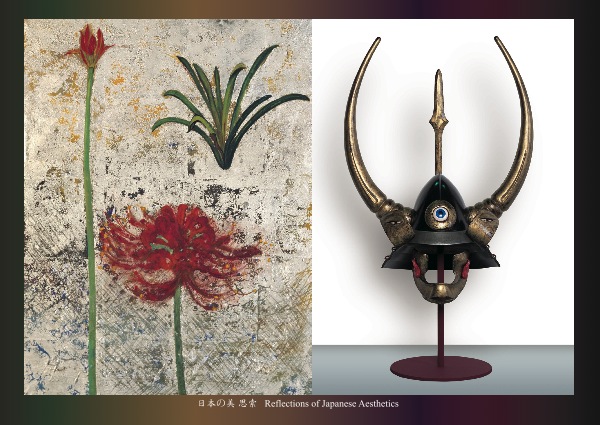During the month of October, NY Coo Gallery will be hosting mother (Mitsuko) & daughter (Rei)fs eclectic exhibition comprised of 3D objects and paintings.
Mitsuko Yoshizawa, together with her sculptor husband founded their own company, Lucky Wide. The company specializes in creative art works such as 3D objects, stage art design/scenography, and museum replications. She then decided to go back to school to study Japanese art at Musashino Art University.
Mitsuko has been continuously challenging herself to find new ways to express the essence and beauty of Japanese aesthetic art. The theme of her painting exhibition feature plants and raw materials in a fantastic realm.
The daughter Rei is currently studying botany and zoology at a Japanese university. Nevertheless, she has always been under the influence of her father who manages a creative art business and her mother who is a Japanese aesthetic artist. Hence, she became interested in old Japanese kabuto (samurai warrior helmets), which has opened her eyes to the beauty of Japanese traditional art.
As Rei started to devote herself more into kabuto and its history, her ambition grew. She has been fascinated by its beauty, psychological essence, and significance, which has inspired her to design her own original kabuto pieces.
Some of her art works that are featured in this exhibition include: gThird-Eyed Kabuto,h which is a piece inspired from the Japanese kabuto of the 16th century. Rei has incorporated the gThird-Eyeh to signify the concept of perception. The gThird-Eyeh (false-eye) is in itself already an esoteric concept that symbolizes a state of enlightenment or gthrough the eyes of the Buddhah and the concept of gseeing the bigger picture/universe.h In addition, she is emphasizing the focus to see our inner-selves to viewers, via her third eye.
In any period, a personified cat lives like gfloating clouds and running waterh that stresses the concept of individualism and free will:
One of the kabuto in the exhibition has a dragon, which is believed to take oneself to the fantastic realm:
There will also be katana (The God of Fire), which is believed to have a sacred bond to each samurai. Katana is portrayed in a concrete form in this peaceful alternate reality world.
Both kabuto and katana are considered as weapons. Yet, in their art pieces, they are sacred objects believed to symbolize peace. All the 3D pieces are Fiberglass Reinforced Plastic-made and constructed at Lucky Wide. Additionally, the kabuto helmets are made in real life sizes.
During the 15th and 16th centuries, many battles were fought between different lords.
Each warrior fought under the supreme authority of his shogun. Even so, among the disciplined warriors, there were those who believed in national unification and restoration of peace.
The kabuto was not only to protect warriorfs head, but also reflected their identity and one can see the intricate designs that showed their inner artistic beauty.
In 1603, under Ieyasu Tokugawa (shogun), general peace and community was finally restored. The Edo period (during which the capital moved to the modern day city of Tokyo) marked a dramatic change in Japanese history, yet the fundamentals and philosophical backgrounds were derived from the way of Japanese warriors and the honor of samurai.
The beauty associated with the cultural changes in the Japanese history, is being enhanced by the perception from the mother, Mitsuko, and the daughter, Rei, who are from two different generations. Together they have created their own interpretation of the fantastic realm of Japanese traditional art.
History has the potential to be re-written from hidden discoveries. The potential is limitless, in which we can create a life size objects that will bring out the beauty of Japanese art.
Please come and enjoy the beautiful art works and their deep meanings within each of them that all portray peace via Japanese history and culture. |


